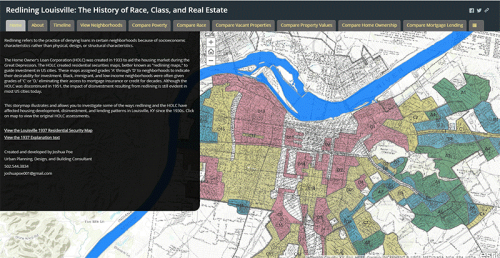January 20, 2019

This story map illustrates and allows us to investigate some of the ways redlining and The Home Owners’ Loan Corporation (HOLC) have affected housing development, disinvestment and lending patterns in Louisville, Kentucky, since the 1930s.
When urban design consultant Joshua Poe showed me a redlining map of Louisville, Kentucky, I saw how the intersections of racism and poverty are interwoven. More about the map, which was recently recognized by Harvard University, is available at insiderlouisville.com/government/redlining-louisville-map-wins-harvard-university-honor.
Poe helped me to see how redlining, the systematic denial of mortgages and fair housing for African-Americans and people of color in Louisville, resulted in continued racial and economic disparity.
“When the redlining maps were made and then handed over to mortgage companies, what was created were two economies. African-Americans and people of color in Louisville existed in that second economy,” Poe said. “This is not a historical perspective; it is the current reality of Louisville.”
What is disturbing is that many feel comfortable simply offering charity. Though charity may assist some individuals, it does not change power dynamics or provide long-term benefits to communities.
Partnering with oppressed families to increase income, gain employment, obtain educational opportunities and purchase property is a more just way to move toward eliminating poverty and disrupting structural racism. African-Americans and people of color in Louisville were led toward rental markets. You don’t gain equity in rental housing. And, those who were able to purchase houses were led to neighborhoods where they will never accumulate the kind of equity those in other parts of town not only achieve but expect. How will we as leaders in the Presbyterian Church (U.S.A.) improve our society, instead of passively accepting that many of our members live in poverty and face structural racism? When will leaders acknowledge the unearned privilege they possess, which comes from having access to tangible resources and social rewards that are denied to others?
The discussion is both fascinating and deeply troubling. We learn (and some of us rediscover) that redlining and white supremacy in the city planning of many major cities has placed our cities where they are today, with problems that would not have existed if decades ago, we had had the strength to love our siblings as we love ourselves.
Rhashell D. Hunter, Director of Racial Equity & Women’s Intercultural Ministries for the Presbyterian Church (U.S.A.)
Today’s Focus: Race Relations Day/Racial and Intercultural Justice Sunday
Let us join in prayer for:
PC(USA) Agencies’ Staff
Lee Hinson-Hasty, FDN
Randy Hobson, OGA
Let us pray:
O God, help us to become aware of our biases and to interrupt privilege, to risk building deeper relationships with those who are different from us, and to open ourselves to listen more, learn and appreciate others’ cultural heritages. Empower us to end racism and transform our church into the intercultural community of God.
Revised Common Lectionary Readings for Sunday, January 20, 2019, the Second Sunday in Ordinary Time (Year C)
![]() You may freely reuse and distribute this article in its entirety for non-commercial purposes in any medium. Please include author attribution, photography credits, and a link to the original article. This work is licensed under a Creative Commons Attribution-NonCommercial-NoDeratives 4.0 International License.
You may freely reuse and distribute this article in its entirety for non-commercial purposes in any medium. Please include author attribution, photography credits, and a link to the original article. This work is licensed under a Creative Commons Attribution-NonCommercial-NoDeratives 4.0 International License.